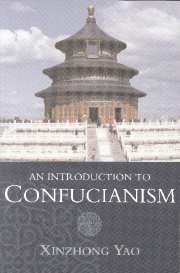Book contents
- Frontmatter
- Contents
- List of illustrations
- Preface
- Confucianism in history: chronological table
- Introduction: Confucian studies East and West
- 1 Confucianism, Confucius and Confucian classics
- 2 Evolution and transformation – a historical perspective
- 3 The Way of Confucianism
- 4 Ritual and religious practice
- 5 Confucianism and its modern relevance
- Select bibliography
- Transliteration table
- Index
- Plate section
5 - Confucianism and its modern relevance
Published online by Cambridge University Press: 05 June 2012
- Frontmatter
- Contents
- List of illustrations
- Preface
- Confucianism in history: chronological table
- Introduction: Confucian studies East and West
- 1 Confucianism, Confucius and Confucian classics
- 2 Evolution and transformation – a historical perspective
- 3 The Way of Confucianism
- 4 Ritual and religious practice
- 5 Confucianism and its modern relevance
- Select bibliography
- Transliteration table
- Index
- Plate section
Summary
The modern era of Confucianism began with its responses to the challenges of Western powers. Emotionally being engaged in and holding to tradition, Chinese and Korean Confucians did not initially respond to modernity as quickly and rationally as their counterparts in Japan, and fatally slowed down the process of Chinese and Korean modernisation during the second half of the nineteenth century. Confucianism came into the twentieth century burdened with scholasticism, accompanied by extreme moralism and blamed for intellectual, political and social failures of East Asia in the modern time.
The vulnerable situation of Confucianism in East Asia in general did not change until rapid industrialisation brought about cultural confidence and the need for traditional values in the 1970s. Since then, more and more people, academics and politicians alike, have come to rethink the tradition more positively and to reclaim their lost identity by asserting that cultural idiosyncrasy lies in the very heart of modernity. In examining the cultural elements in economic and political courses, they find that East Asia, though divergent economically and politically, is an area that shares a common cultural background provided by Confucian values. They have also come to realise that Confucianism as the shared culture in the ‘Confucian world’ CAN be a positive, progressive and valuable factor in promoting economic and cultural development. In the enthusiastic search for the ‘cultural root’, Confucianism is brought into focus, and becomes relevant to people's lives again.
- Type
- Chapter
- Information
- An Introduction to Confucianism , pp. 245 - 286Publisher: Cambridge University PressPrint publication year: 2000



